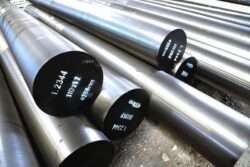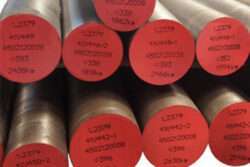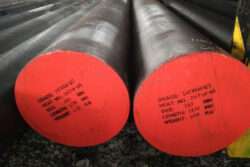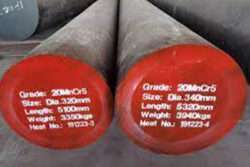Alloly Steel 16MnCr5/1.7131
16MnCr5 steel are alloyed case hardening engineering steels for parts which require core tensile strength of 800 – 1100 N/mm² and good wearing resistance. It is an engineering material typically used to manufacture piston bolts, camshafts, levers and other vehicle and mechanical engineering components. It is a low-alloy steel that is composed of a combination of elements, including carbon, manganese and chromium.
Chemical Composition
| Chemical Composition % | |||||||
| Standard | Steel Name (Steel Number) | C | Si ≤ | Mn | P ≤ | S | Cr |
| EN 10084 | 16MnCr5 (1.7131) | 0.14-0.19 | 0.4 | 1.00-1.30 | 0.025 | ≤ 0.035 | 0.80-1.10 |
| EN 10084 | 16MnCrS5 (1.7139) | 0.14-0.19 | 0.4 | 1.00-1.30 | 0.025 | 0.020-0.040 | 0.80-1.10 |
Mechanical Properties
1.7131 material, 16MnCr5 steel Brinell hardness
- Soft annealed: ≤ 207 HBW
- Treated to hardness: 156-207 HBW
- Treated to ferrite-pearlite structure and hardness: 140-187 HBW
- Normalized: 138-187 HBW
EN 1.7131, 16MnCr5 Tensile strength (after hardening and tempering at 200 °C)
- ≤ 16mm: Min. 1000 MPa
- 16 < Dia. ≤ 40mm: Min. 800 Mpa
- 40 < Dia. ≤ 100mm: Min. 600 Mpa
Heat Treatment Specification of 16MnCr5 (1.7131 Steel)
- End quench test Austenitizing temperature: 870℃ (30-35 minutes)
- Carburizing temperature: 880-980 ℃
- Core-hardening temperature: 860-900 ℃
- Case-hardening temperature: 780-820 ℃
- Tempering: 150 – 200 ℃ (≥ 1 hour)
Application
Steel grade 16MnCr5 is used for surface hardening when grouting, nitrocarburising, nitriding and for other types of surface chemical-thermal treatment. It is used to make shafts, axles, gears, gear wheels, bolts, levers and other transport and machine-building components.







Reviews
There are no reviews yet.